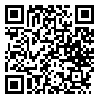Volume 22, Issue 1 (March 2024)
Iranian Rehabilitation Journal 2024, 22(1): 139-142 |
Back to browse issues page
Download citation:
BibTeX | RIS | EndNote | Medlars | ProCite | Reference Manager | RefWorks
Send citation to:



BibTeX | RIS | EndNote | Medlars | ProCite | Reference Manager | RefWorks
Send citation to:
Sadighi G, Rajabi M, Dezham T. First Manic Episode After COVID-19 Infection: A Case Report After A Two-year Follow-up. Iranian Rehabilitation Journal 2024; 22 (1) :139-142
URL: http://irj.uswr.ac.ir/article-1-1817-en.html
URL: http://irj.uswr.ac.ir/article-1-1817-en.html
1- Psychosis Research Center, University of Social Welfare and Rehabilitation Sciences, Tehran, Iran.
2- Department of Clinical Psychology, School of Behavioral Sciences, University of Social Welfare and Rehabilitation Sciences, Tehran, Iran.
3- Department of Psychiatry, School of Behavioral Sciences, University of Social Welfare and Rehabilitation Sciences, Tehran, Iran.
2- Department of Clinical Psychology, School of Behavioral Sciences, University of Social Welfare and Rehabilitation Sciences, Tehran, Iran.
3- Department of Psychiatry, School of Behavioral Sciences, University of Social Welfare and Rehabilitation Sciences, Tehran, Iran.
Abstract: (2601 Views)
Objectives: On 11 March 2020, the World Health Organization (WHO) announced the detection of a new virus epidemic in Wuhan, China. Many studies have shown that the SARS-CoV-2 virus can cause mental disorders, such as anxiety, depression, and bipolar disorder. Here, we presented a case without a history of psychiatric illness. After contracting COVID-19
Case Presentation: A 40-year-old woman was hospitalized for ten days and then discharged. However, on the fourth day following her discharge, the patient exhibited talkative, energetic, and distractible behavior. She believed herself to be God’s daughter with the ability to cure COVID-19, leading to abnormal behaviors and necessitating readmission. Treatment was started with haloperidol 5 mg, sodium valproate 500 g, and clonazepam 2 mg. By the 17th day, the patient’s mania rating scale score had decreased.
Discussion: This case report underscores the significance of viral diseases as triggering and exacerbating factors in bipolar disorder. It also emphasizes the importance of considering viral infections as potential causes of psychiatric symptoms in individuals with COVID-19.
Case Presentation: A 40-year-old woman was hospitalized for ten days and then discharged. However, on the fourth day following her discharge, the patient exhibited talkative, energetic, and distractible behavior. She believed herself to be God’s daughter with the ability to cure COVID-19, leading to abnormal behaviors and necessitating readmission. Treatment was started with haloperidol 5 mg, sodium valproate 500 g, and clonazepam 2 mg. By the 17th day, the patient’s mania rating scale score had decreased.
Discussion: This case report underscores the significance of viral diseases as triggering and exacerbating factors in bipolar disorder. It also emphasizes the importance of considering viral infections as potential causes of psychiatric symptoms in individuals with COVID-19.
Article type: Case Reports |
Subject:
Psychiatry
Received: 2022/11/9 | Accepted: 2023/09/5 | Published: 2024/03/1
Received: 2022/11/9 | Accepted: 2023/09/5 | Published: 2024/03/1
Send email to the article author








